|
|
| |
| EVENTS |
|
|
> Newly-elected MNAs briefed on Federal Budget Process in Pakistan
|
|
|
| |
|
Briefing Session
June 04, 2013
Islamabad
|
|
| |
June 04; In a special PILDAT Briefing & Orientation today, newly-elected Members of the 14th National Assembly were briefed by veteran MNAs including Syed Naveed Qamar, former Finance Minister, Mr. Shah Mahmood Qureshi, former Foreign Minister and Mr. Nohman Ishtiaq, expert on Public Finance. |
|
| |
The orientation titled Federal Budget Process in the National Assembly of Pakistan: How can MPs Optimise Contribution to Budget Debate mostly brought together first-time elected MNAs who engaged in a constructive interaction with the panel of speakers.
|
|
| |
Explaining the Federal Budget Process, Mr. Nohman Ishtiaq said that as per article 80 of the Constitution, the Federal Government presents an annual budget statement to the National Assembly. Walking MNAs through budget books, Nohman emphasised that in order to understand budget, it is essential to first understand policy, which is made possible through Federal Medium Term Budget Estimates for Service Delivery. Explaining the Federal Budget Process, he added that a budget call circular is issued by the Ministry of Finance to all ministries. The Government also presents a Budget Strategy Paper to the cabinet. However, he emphasised that Parliamentary committees, which are supposed to be part of the loop of budget are generally not allowed to play a role in Pakistan. |
|
| |
Presenting a lay out of the 2012-2013 budget as an example to MNAs, Nohman shared that Rs. 926 billion or 32% of the budget was allocated for debt servicing, Rs. 545 billion or 19% for defence, Rs. 141 billion or 5% for pensions, Rs. 262 billion or 9% for federal recurring expenses, Rs. 238 billion or 8% for subsidies including those on energy, Rs. 27 billion or 2% for grants to provinces, over and above NFC, Rs. 382 billion or 13% for grants and Rs. 360 billion or 12% for public sector development programme. However, he explained, while the national income is spent in big ticket items such as debt servicing, defence, pensions and salaries and perks, items such as federal recurring expenses, grants to provinces, additional grants, subsidies and PSDP, have to be met by borrowing that has put the country into a debt-trap. |
|
| |
He said that it is important for MNAs to understand the distinction that while budget making is the job of the executive, its scrutiny, analysis and passage is the responsibility of the National Assembly. However, Parliament has been unable to play that role effectively. Parliamentary committees should be allowed to scrutinise budget after its presentation, which would mean that the Government should present budget at least a month or two months before June every year. Nohman also shared that Government�s blanket powers on supplementary and excess budget, as given in Article 84 of the Constitution, create fiscal indiscipline and MPs must consider amending the article. While a reasonable power of supplementary budget is available to all governments, they can not do so without informing the Parliament on a regular basis. The misuse of this power by successive governments has resulted into budgetary deficit of Rs. 367 billion in 2008, over and above Parliament�s approved allocation, and Rs. 935 billion in 2012, both of which have been election years. |
|
| |
Briefing MNAs on how they can effectively use the tools available in rules of Assembly to scrutinise budget and effectively contribute in budget debate, Syed Naveed Qamar, MNA, said that it is important for MNAs to utilise the time of budget debate effectively. MNAs should be prepared for budget debates in the start of the session to use maximum time. Parliamentary parties should divide topics among their members to allow for a focussed debate. |
|
| |
He also explained that traditionally, the business advisory committee finalises 6-7 ministries on which debate is to focus. As a result, opposition is to also make cut motions on these. He said that there are 3 types of cut motions � including Policy cut, in which MPs argue that a certain policy should be discontinued; also known as reducing it to rupee 1; Economy cut, which argues for a reduction of a certain percentage; and Token cut, which means that MNAs argue for a cut of Rs. 100 or less. He said that cut motions are prepared by opposition MNAs using forms available in the Assembly. MNAs, therefore, have to focus their energies towards preparing cut motions to the maximum possible number. He said that voting on demands, including vote on cut motions, generally takes 3 days. |
|
| |
The clause by clause discussion on finance bill, including taxation proposals, follows voting on demands for grants. He advised that a rather dubious and unconstitutional practice of slipping irrelevant laws into the Finance Bill has also taken root in Pakistan and MNAs have to be very vigilant that this practice is not adopted in the budget. He shared that Senate has been very vigilant of late in this regard but it really is the job of National Assembly to be vigilant.
Syed Naveed Qamar also briefed MNAs on the unwelcome practice of successive Governments to introduce SROs. He said that though upon pressure, Governments have laid SROs in the Parliament when asked but a lot goes un-noticed and MNAs have to effectively play their oversight role in guarding against this practice.
Coordinating the discussion, Mr. Shah Mahmood Qureshi, MNA, said that it is important for MNAs across parties to join hands for necessary Parliamentary and constitutional reforms to strengthen budget scrutiny and oversight by Parliament.
Earlier, welcoming newly-elected MNAs, Ms. Aasiya Riaz, Joint Director PILDAT, said that passing the budget is one of the most important powers and responsibilities of elected representatives of the people. She highlighted that PILDAT has been working very closely with the Parliament and Parliamentarians to bring in needed reforms to the budget process in Pakistan to ensure parliamentary assent to the budget moves beyond its symbolic value at present. Outlining key areas requiring reform of the budget process according to PILDAT, she said that there should be an effective mechanism to invite and receive Pre-Budget proposals from the Parliament and its Committees; the period between the presentation of the Budget in the Parliament and its passage should be extended to at least 60 days allowing Parliamentary Standing Committees a key role in budget review. She also introduced the key PILDAT publications shared with MNAs on Federal Budget Process which included: |
|
| |
- Parliamentary Budget Reforms In Pakistan [Download PDF]
- The Federal Budget Process In Pakistan [Download PDF]
- Medium Term Budgetary Framework [Download PDF]
- Effective Budget Process In Pakistan [Download PDF]
- How To Review Budget And Demands For Grants, A Guide For Parliamentary Standing Committees [Download PDF]
|
|
| |
|
|
| |
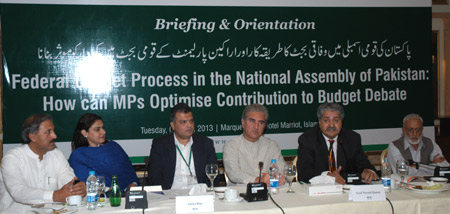
|
|
| |
|
|
| |
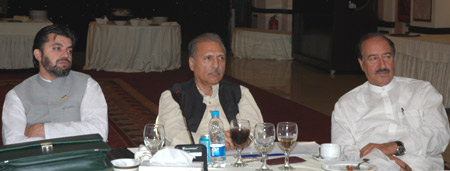
|
|
| |
|
|
| |
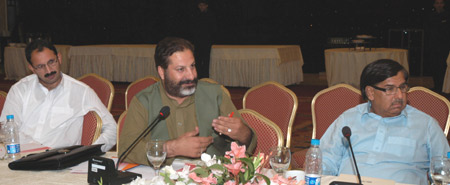
|
|
| |
|
|
| |
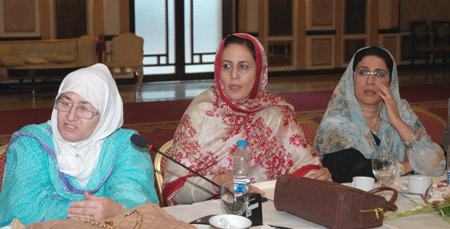
|
|
| |
|
|
| |
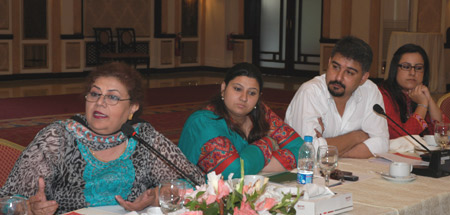
|
|
| |
|
|
| |
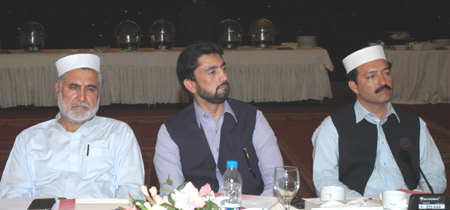
|
|
| |
|
|
| |

|
|
|
|
|
|
|
|
|